Commentary on the Origin of the Document
As a result of defeat in the Civil War, at the end of October 1920 the evacuation of the Russian Army under Gen. P. N. Wrangel from Crimea took place. The evacuation from Sevastopol was organized almost flawlessly. Everything “that could float” was put on the water, so that numerous refugees joined the army. Together with them Metropolitan Anthony (Khrapovitsky, d. 1936) of Kyiv and Galicia, along with four bishops who had been part of the church administration functioning in Crimea, arrived in Constantinople.
Metropolitan Anthony had a great respect for the Eastern Patriarchs.[1] Therefore, the first reaction of Metropolitan Anthony to the creation of the Russian Church Abroad is understandable, as described by Protopresbyter Grigorii Lomako (d. 1959), who knew him well:
I clearly remember that dim, foggy December day of 1920, when Bishop Veniamin—always impetuous, never balanced—then bishop of the “Christ-loving Army,” came into Constantinople from our battleship General Alekseev, anchored in the harbor, with a proposal to open in Constantinople a Higher Church Administration. At the very beginning of emigration in Constantinople, Metropolitan Anthony and I were standing in an empty room on the top floor of the Russian embassy in Constantinople by an open large window, looking out at the Bosporus, the faintly visible minarets of Scutari through the rain, and the gray bulk of the Selimiye barracks in Kadiköy. Suddenly the corridor door burst open noisily, and when we turned around, we saw Bishop Veniamin running in. From the threshold, addressing the Metropolitan, he loudly exclaimed: “Vladyka! [Master!] We have decided to open here the Higher Church Administration of the Church Abroad!” With his characteristic brusqueness and directness, Metropolitan Anthony responded to this declaration, saying that one had to be a complete fool to think of opening one’s own Higher Church Administration in the capital city of the Ecumenical Patriarch: “Who advised you to do this foolishness?” Bishop Veniamin: “It was my own idea!”[2]
Apparently, Fr. Grigorii’s memory failed him and the events he described must have occurred in November. According to the text of the decision of the Holy Synod of the Ecumenical Patriarchate dated November 16, 1920, the refugee Russian bishops submitted to this Synod a petition for permission to organize their church life, in response to which the decree published here was issued.[3] In the protocol of the meeting of November 6/19, 1920, the Supreme Church Administration in Southern Russia, being on the ship Alexander Mikhailovich abroad as document no. 1, adopted the following resolution:
In view of the concentration of a vast number of refugees in various states and parts of the world, who have no contact with Soviet Russia and cannot communicate with the Supreme Church Administration under His Holiness the Patriarch [Tikhon – P.A.P.], and also due to the necessity of caring for the Russian army that left Crimea:
- a) to continue the authority of the members of the Supreme Church Administration in caring for all aspects of church life and the Army in all states that have no communication with His Holiness the Patriarch;
- b) to select Constantinople as the place of the Administration’s activity, as the most central point;
- c) to communicate with the Ecumenical Patriarchate in order to clarify the canonical relationship.[4]
In the final point of the document, there was an appeal to Peter N. Wrangel to likewise address the Ecumenical Patriarchate. The following bishops took part in the meeting:
Metropolitan Anthony (Khrapovitsky) of Kyiv and Galicia,
Metropolitan Platon (Rozhdestvensky) of Odessa and Kherson,
Archbishop Theophan (Bystrov) of Poltava and Pereiaslavl,
Bishop Veniamin (Fedchenkov) of Sevastopol.
Thus, the visit to the Ecumenical Patriarchate with submission of a petition took place. Apparently, the petition was submitted on November 29 (New Style) or November 16 (Old Style), as follows from the aforementioned text of the Ecumenical Patriarchate.
Here is what eyewitness Fr. Grigorii Lomako writes about this visit:
Metropolitan Anthony, who at first objected (the only one among them), was somehow persuaded by others, and some time later he headed the deputation of Russian bishops (Metropolitans Anthony and Platon, Archbishops Anastassy and Theophan of Poltava, and Bishop Veniamin) to the Patriarchate to the locum tenens of the then vacant See of the Ecumenical Patriarch, Metropolitan Dorotheos of Brussa. The deputation asked permission to open a Higher Church Administration in Constantinople. The far-sighted Greeks neither refused nor permitted. They offered all kinds of compliments about the wisdom, learning, and authority of Metropolitan Anthony, and verbally told him that, relying on his authority, under which nothing uncanonical could take place, they permitted what he requested.[5]
Fr. Grigorii also notes that the document numbered 9084 was received some time later. Until now, this document was available in Russian translation only from the brochure К делу о Всезаграничном Высшем Русском ЦерковномУправлении.[6]
In the catalog of files in the archive of the Ecumenical Patriarchate, a handwritten copy of this document dated December 2, 1920, has been preserved.[7] Number 9084 is the sequential number assigned to the document by the Patriarchate during its processing. In 1924 the Greek original was reproduced in a pamphlet published by the Ecumenical Patriarchate in Constantinople, Ζήτημα τῶν Ῥώσων Προσφύγων Ἀρχιερέων [The Question of the Russian Refugee Hierarchs], containing documents of the Ecumenical Throne concerning the Russian Church Abroad, as well as two appeals from Russian refugees published in the same pamphlet in Russian. The text presented to your attention is the same as that in the brochure К делу verified against the Greek text contained in Ζήτημα. It is also of interest that this document was signed by the locum tenens of the patriarchal throne, Metropolitan Dorotheos of Brussa (d. 1921) —the same hierarch who in January 1920, on behalf of the Patriarchate, signed the message “To the Churches of Christ Everywhere,” which became a landmark in Orthodox participation in the ecumenical movement.
The publication of this document helps to understand what actually happened between the Russian refugee bishops and the Ecumenical Patriarchate. A careful reading of the document shows that in 1920 the Ecumenical Patriarchate already considered that all the non-Orthodox diaspora belonged to its jurisdiction. The document granted the Russian refugees rights of limited autonomy within the framework of the Ecumenical Patriarchate. Only in this context—of the Ecumenical Patriarchate’s existing blessing—can one understand the following statement in the testimony of St. Patriarch Tikhon during his interrogation by the GPU in Moscow on January 30, 1922, that he “gave his blessing to the Higher Church Administration organized by [Metropolitan – P.A.P] Anthony in Constantinople.”[8]
I would like to expresses my gratitude to the following persons, without whose participation this publication could not have been realized: His Holiness Ecumenical Patriarch and Archbishop of Constantinople Bartholomew; Archimandrite Kaisarios, archivist of the Ecumenical Patriarchate; Protopresbyter Patrick Viscuso of the Ecumenical Patriarchate; Archdeacon John Chryssavgis of the Ecumenical Patriarchate; Nicholas A. Ohotin, Director of Public Relations of the Synod of Bishops of the Russian Orthodox Church Outside Russia; Nicolas Mabin, subdeacon of the Cathedral of the Nativity of the Theotokos of the Russian Orthodox Church Outside Russia, London, UK; Dr. Anna Ransmayr, Head of the Specialized Library of Byzantine and Modern Greek Studies of the University of Vienna (Austria); Prof. Antoine Nivière, Doctor of Philology, Head of the Department of Russian Literature and History, University of Lorraine (France). My special thanks go to Dr. Anthony Hirst, Director of the International Byzantine Greek Summer School hosted by Trinity College Dublin (Ireland), for generously producing the English translation of the document reproduced below.
Protodeacon Andrei Psarev,
September 29, 2025
Translation
The hand-written draft begins with a very simple address:
To Anthony of Kiev and Galicia
In the published version this is amplified as follows:
Your Reverence, Metropolitan of Kiev and Galicia, beloved brother to us in Christ our God, honourable Anthony, in a brotherly manner we embrace in the Lord Your Reverence most dear to us.
In the synodical council, on the sixteenth day of last month[9], was read out the first report, which the piety of this Most Holy Council together with the Most Reverend Hierarchs who had signed it put forward for submission. It concerns the difficult situation created by recent events, and refers to the issue of pastoral oversight and the fulfilment of the religious needs of both the multitude of Russian soldiers and refugees who have been gathered together in special camps and refuges in Orthodox territories, and also those in Russian communities in foreign parts, which hitherto had the direct pastoral oversight of the Most Blessed Patriarch of all Russia and the hierarchs in Russia.
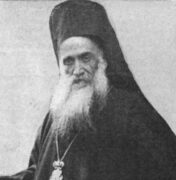
The Locum Tenens of the Ecumenical Patriarchate, Dorotheos, Metropolitan of Brusa (Mammelis, 1861-1921). Photo: orthodoxhistory.org
The Holy Council, with sympathy first and foremost at the reading of this report, having expressed again its sorrow for the long and great tribulations of the pious Russian people and the holy sister Church of Russia, and having also fervently prayed for the swift termination of the aforesaid, carefully took into consideration the request formulated by Your Reverence, which refers to the issue of the provision and satisfaction of the religious needs of the above persons who are outside of Russia and cut off from connections with the present temporary flock of the Russian Church. Αnd, having earnestly given thought to the related issue which has arisen, it judged that, regarding the pastorship of above-mentioned multitude and the most effective safeguarding and support of them, as also of the communities mentioned, Your Reverence and the rest of the hierarchs to be here mentioned, that is to say, the Most Reverend Metropolitan of Cherson, the venerable Platon, the Most Reverend Archbishop of Chisinau, the venerable Anastassy, the Most Reverend Archbishop of Poltava, the honourable Theophan, the Most Reverend Archbishop of Sevastopol and the head of the clergy of the armies of both land and sea, the venerable Veniamin, should form, under the supreme patronage of the Ecumenical Patriarchate, a temporary ecclesiastical committee which would oversee and direct the ecclesiastical life in general of the Russian communities who are in foreign parts, in the region of the non-Orthodox periphery, as well as those Russian troops and Russian refugees in Orthodox countries but in army camps and special refuges, out of contact with the rest of the Orthodox population, who live in towns and villages, and be responsible for sending to them priests, preachers, altar cloths and whatever else is necessary, visiting them in person, resolving through exhortation and advice differences which may arise among them, and in general undertaking whatever is ecclesiastically or religiously required and necessary for the comfort and support of the aforementioned Russian Orthodox Christians. But when it is a matter of marital disputes requiring the examination and judgement of a regular court, they must be submitted by the parties concerned to the regular ecclesiastical courts of the Archbishopric of Constantinople, in the metropolitan cities of the Ecumenical Throne, and directly to the Ecumenical Patriarch if they should come from Russian communities in foreign parts.
Gladly communicating these things as our response in this letter, we pray again that the Lord God may grant a swift end to the hardships and trials of this pious people and provide to them the desired comfort and support. And besides that, may the years of Your Reverence, most dear to us, and of the rest of the brothers in Christ who are with you, be many, healthy and salvific.
December 2nd 1920
The Incumbent of the Ecumenical Throne
Dorotheos of Prousa
Endnotes
[1] “…by 1915, when a successful end to the war seemed a near reality… various Russian [governmental – P.A.P] departments had drawn up memoranda for internal use regarding the future organization of Russian Constantinople – military, economic, ecclesiastical. The memoranda for the Holy Synod were prepared by I. I. Sokolov and Archbishop Anthony (Khrapovitsky)… The Russian Patriarch would occupy second place after the Ecumenical Patriarch, who, in turn, would receive his due primacy of honor in the Orthodox world. Constantinople could become the second capital and the residence of the Russian tsar.” История Русского Православного зарубежья. Русское православное зарубежье до 1917 г. [History of the Russian Orthodox Diaspora. Vol. I: The Russian Orthodox Diaspora before 1917] V.S.Bibikov ed. et al. 1(Мoscow: Publishing house of Moscow Patriarchate, 2016); 141–142.
[2] «Воспоминания» [Reminiscences], Церковно-исторический вестник [Church Historical Herald], , 24–25 (2017-2018): 155.
[3] Ibid., 156; note 181.
[4] Archive of the Synod of Bishops of ROCOR in New York.
[5] «Воспоминания», 155–56.
[6] [On the Matter of Russian Supreme Church Authority Abroad] (Constantinople, 1924); 5–7. This 32-page long pamphlet was published by Imp. L. Babok & Fils, a printing house often employed by Russian emigrees in Constantinople (Galata, Rue Kamond 8) in the 1920s. The address corresponds to today’s Kamondo Street in Karaköy (formerly Galata), named after the prominent Camondo family. К делу evidently refers to the Archive of the Ecumenical Patriarchate. The brochure is de facto anonymous containing no authors names. However, from the text of the appeal to Ecumenical Patriarch Gregory dated April 24, 1924, in this same brochure, it is clear that the authors were Orthodox Russians who wished to repatriate from Constantinople to Russia and therefore did not support the uncompromising stance of the Russian Church Abroad toward the Bolsheviks (Dating of the appeal according to the text: Ζήτημα τῶν Ῥώσων Προσφύγων Ἀρχιερέων, [Constantinople, 1924]; 31). An anonymous author published in Paris in Церковный вестник Западно–Европейского русского экзархата КонстантинопольскогоПатриархата [Church Herald of the Western European Russian Exarchate of the Ecumenical Patriarchate] 3 (1956):13–14, an a translation of the document no. 9084 in the article «К 25-ти летию русского православного экзархата в Западной Европе» [“On the 25th Anniversary of the Russian Orthodox Exarchate in Western Europe.”] This Russian translation is identical to that printed in the brochure К делу.
[7] The original of the document, transmitted to the Church Administration Abroad in December 1920, is in all likelihood lost. A copy is preserved in Record Book A-90, pp. 552–553. A letter accompanying the document erroneously dates it to 1919. I have given the title of this document here for this publication.
[8] Акты святейшего патриарха Тихона [Acts of His Holiness Patriarch Tikhon] (Москва, 1994), 261.
[9] In the Greek pamphlet it is mistakenly dated as “the sixth of the month,” whereas in the handritten original the date is 16th.

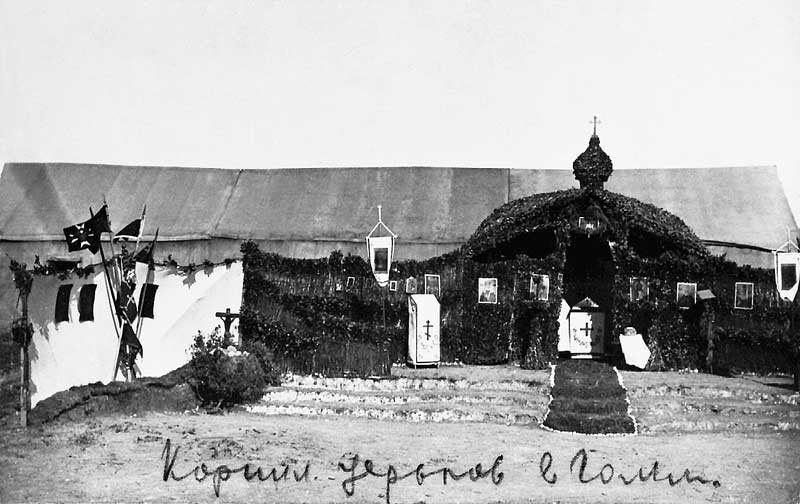
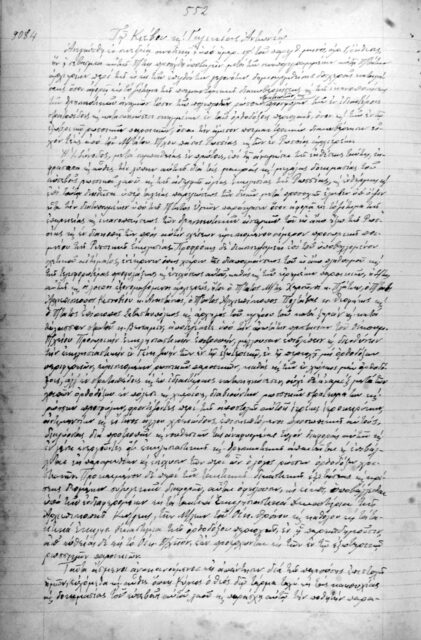

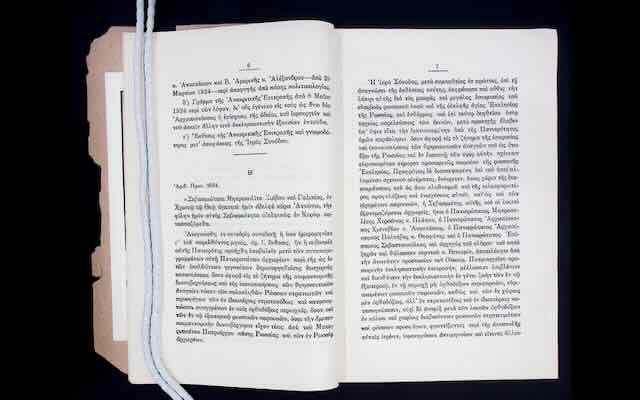
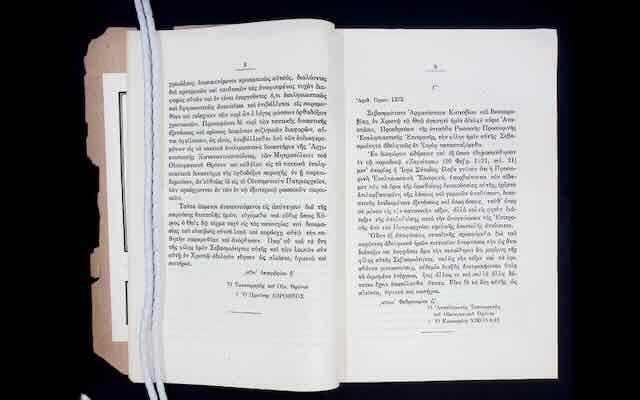
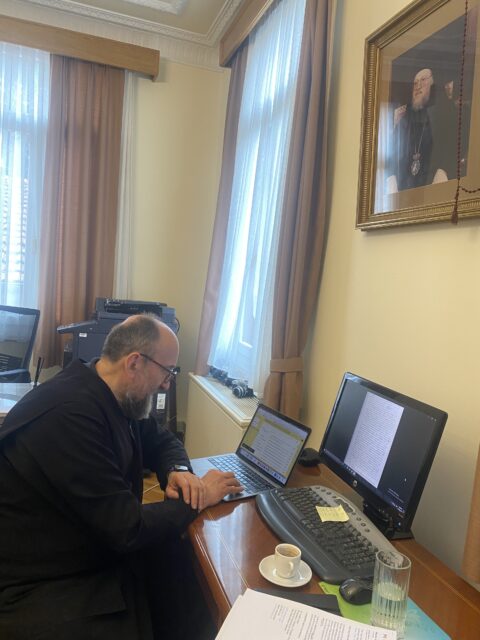
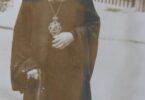
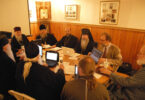

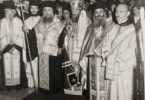

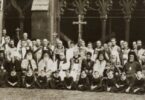


Wonderful to see this document! Thank you for your efforts in finding and publishing this.